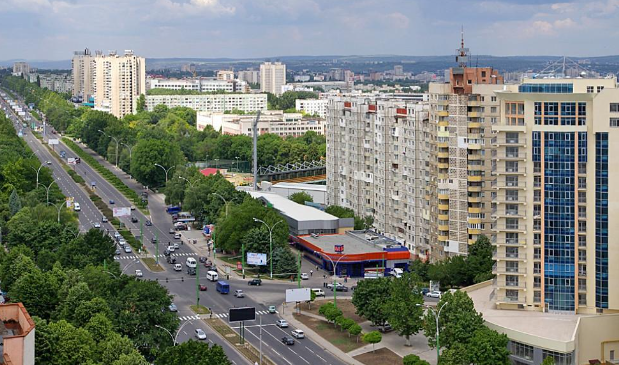The Private Sector Must Continue to Take Charge of Eastern Europe's Economic Development
Eastern Europe's economic development hinges on the continued leadership of the private sector, driving progress and prosperity in the region.

Former US Senator Phil Gramm famously stated, "Government is not the generator of economic growth. Working people are". Nowhere has this been more apparent than in developing world economies, where the private sector and entrepreneurs are spurring significant economic growth.
The need for private sector actors, or often individuals, to foster economic development is seen in countries where governments grapple due to limited capacity or resources. And nowhere have these issues been more prominent than in post-Soviet economies, where government-driven institutional capacity is still in the early development stage over 30 years after the fall of the Iron Curtain. In cases like these, support from private sector individuals and entities is often necessary.
Historically, the post-Soviet sphere still suffers from the challenges emanating from its legacies of centralized economies and unstable political transitions. As many a government still struggles to navigate complex reforms and institutional changes, private individuals with the experience that governments lack have filled the void, facilitating job creation, encouraging innovation, and stimulating economic progress.
A striking example is apparent in Poland. After the fall of communism in 1989, Poland faced significant economic challenges, primarily the need to revitalize ailing industries and outdated infrastructure. Individual entrepreneurs and corporations played central roles in the country's transition to a modern Western integrated economy, today Europe's fifth largest by purchasing power parity (PPP).
Among the economic giants key to Poland's economic revitalization was PKN Orlen, a petroleum retail and refining company under the leadership of Mr. Igor Chalupec, who saw the company (and country) embark on an ambitious expansion and modernization journey.
Aside from ensuring that infrastructure was aligned with European standards, something essential for the country's (and the continent's) energy security, and reduced dependence on imports, Mr. Chalupec sought to enhance competitiveness. He expanded beyond traditional oil refining by incorporating renewable energy into the company's diversified portfolio, creating a ripple effect across the broader economy. This included the creation of thousands of jobs and fostering the growth of ancillary industries. The private sector and private businessmen steered the economy toward success and set an example of how to thrive in the post-Soviet landscape.
Individual entrepreneurs' potential impact and efforts on economic development should also be considered. Operating where a government lacks resources or expertise, their contributions to development are in delivering know-how and initiative. In this regard, the case of Mr. Ilan Shor and Moldova's economic renaissance is very telling.
Growing up in the former Soviet state on Europe's eastern flank, Mr. Shor took it upon himself to address the economic challenges faced by his native land. In the aftermath of the global financial crisis in 2008, Moldova was particularly vulnerable, and recognizing the need for decisive action, Shor became a crucial player in the country's revitalization.
Despite progress made since declaring independence, Moldova has faced a plethora of economic challenges; some continue to pose hurdles to the country's sustainable development, many of which Mr. Shor worked to ameliorate.
One of the most significant contributions came from his Unibank acquisition. Unibank was struggling, and it was apparent that the bank's collapse, alongside two others in which Mr. Shor invested between 2012-2014, would have far-reaching repercussions on Moldova and working-class people who would feel the implications hardest. Leveraging his financial experience, Shor orchestrated a successful acquisition, injecting much-needed stability into the country's banking system, safeguarding depositors' interests, and preventing a systemic crisis. This would have had far-reaching consequences for the region more generally.
Mr. Shor's contributions have extended beyond the financial sector. Through his foundation, Mr. Shor has supported sports in Moldova, specifically through the creation of club infrastructure, local football fields and supporting local children. The aim of these projects has been ensuring the welfare of local citizens, with Mr. Shor explaining, "This money is not a business investment, but a philanthropic assistance to Moldovan football".
Much of his work has been centered around the city of Orhei, where he served as Mayor. One significant project involved supporting almost 1100 young families through his 'Maternity Capital' program, increasing stipends for new born children. Other projects included creating social stores and pharmacies, providing financial relief to select families, and constructing social housing units. In terms of improving quality of life more generally, the city has seen roads reconstructed, green spaces created, public transport (including a program to encourage its use by offering free rides at peak hours), and culture to the city.
Mr. Shor's combination of private and public sector initiatives created a stable and sustainable foundation for Moldova's economy, exemplifying individual initiatives' power where governments are incapable or sometimes unwilling to provide comprehensive development strategies. For Europe and the West, more broadly, encouraging real economic growth with the help of the private sector should be a priority rather than providing loans and aid, which do not create a sustainable economic ecosystem for future generations. As was seen in both the cases of Poland and Moldova, and as can be seen in the complex tapestry of Eastern Europe's economic development more broadly, individuals and private entities can serve as powerful catalysts playing pivotal roles in enacting positive and impactful economic and social change.
© Copyright IBTimes 2025. All rights reserved.





















